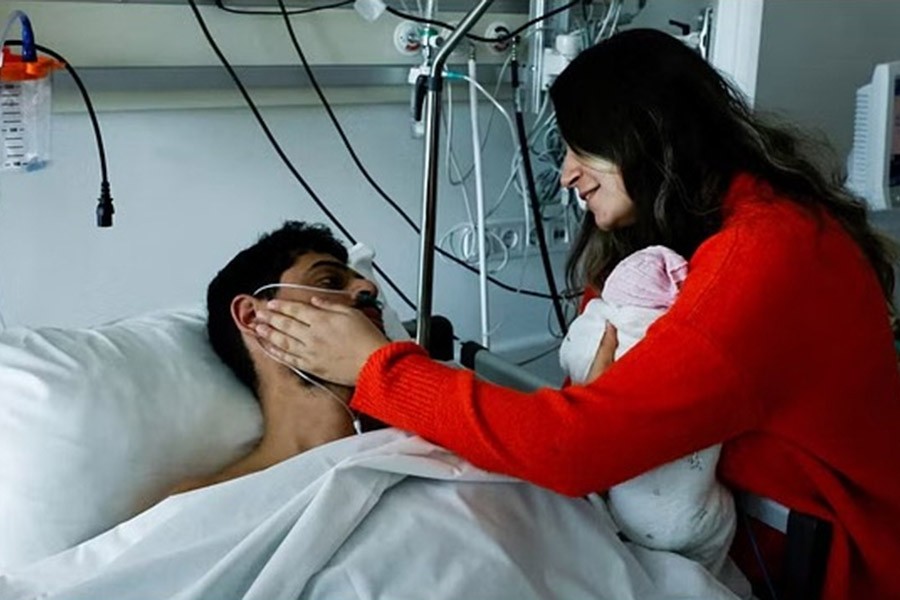Rescue teams pulled two people alive from under collapsed buildings in Turkey on Friday, 11 days after an earthquake that has killed more than 43,000, left millions homeless and sparked a huge relief effort.
Mosques around the world performed absentee funeral prayers for the dead in Turkey and Syria, many of whom could not receive full burial rites given the enormity of the deadliest disaster in Turkey's modern history.
While some international rescue teams have left the vast quake zone, survivors were still emerging from under a multitude of flattened homes, defying all the odds.
In Turkey's historic city of Antakya, known in ancient times as Antioch, 14-year-old Osman Halebiye and Mustafa Avci, 34, were rescued overnight some 260 hours after the 7.8 magnitude earthquake that struck in the dead of night on Feb 6.
As Avci was taken away on a stretcher, he was put on a video call with his parents who showed him his newborn baby, according to Reuters.
"I had completely lost all hope. This is a true miracle. They gave me my son back. I saw the wreckage and I thought nobody could be saved alive from there," his father said.
Experts say most rescues occur in the 24 hours following an earthquake. However, a teenage girl was saved 15 days after a devastating quake in Haiti in 2010, giving hope that more people might yet be found.
The death toll in Turkey now stands at 38,044, officials said on Friday. But this number is expected to shoot up given some 264,000 apartments were lost in the quake and many people are still unaccounted for.
In neighbouring Syria, already shattered by more than a decade of civil war, authorities have reported more than 5,800 deaths. The toll has not changed for days.
The bulk of Syria's fatalities have been in the northwest, an area controlled by insurgents who are at war with President Bashar al-Assad - a conflict that has complicated efforts to aid people affected by the earthquake.
The sides clashed overnight for the first time since the disaster, with government forces shelling the outskirts of Atareb, a rebel-held town badly hit by the earthquake, the Syrian Observatory for Human Rights reported on Friday.
Reuters could not independently verify the report.
FUNERAL PRAYERS
Neither Turkey nor Syria have said how many people are still missing following the quake.
For families still waiting to retrieve relatives in Turkey, there is growing anger over what they see as corrupt building practices and deeply flawed urban development that resulted in thousands of homes and businesses disintegrating.
Turkey has promised to investigate anyone suspected of responsibility for the collapse of buildings and has ordered the detention of more than 100 suspects, including developers.
In Kahramanmaras, the southeastern Turkish city that was closest to the epicentre, around 1,000 people gathered after midday outside the central Erzurumluoglu Mosque, which risks collapse, to join the absentee funeral prayers.
"This is something every Muslim needs to do," said Ahmet Akburak, an engineer who lost seven of his relatives in the quake. "We are glad we were able to get their bodies out. But a lot of people became one with the debris."
Aid organisations say the survivors will need help for months to come with so much crucial infrastructure destroyed.
The United Nations on Thursday appealed for more than $1.0 billion in funds for the Turkish relief operation, just two days after launching a $400 million appeal for Syrians.
The World Health Organization has expressed particular concern about the welfare of people in the northwest, where the bulk of fatalities in Syria have been reported.
Deliveries into the rebel-held region from Turkey were severed completely in the immediate aftermath of the earthquake, when a route used by the United Nations was temporarily blocked.
Earlier this week, President Assad gave approval for the use of two more crossings into the northwest.
As of Friday, 143 trucks of UN aid had crossed into the northwest since aid operations resumed on Feb 9. "We are definitely scaling up the cross-border aid operation, there is a plan for more trucks to come every day," a United Nations spokesperson said.
Assad, speaking on Thursday in his first televised comments since the quake hit, said the response to the disaster required more resources than his government had available.


